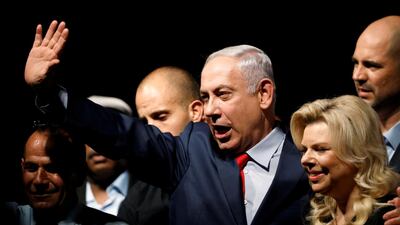Israel has been noticeably stepping up its courtship of Saudi Arabia in recent days, playing up the possibility of (and need for) strategic co-operation against Iran, extreme Islamist groups, and other mutual threats. There is definitely the potential for building on shared threat perceptions between Israel and Gulf Arab countries to try to develop greater dialogue, enhanced co-operation and even, ultimately, a new strategic environment in the region. But there are considerable reasons to doubt the willingness or ability of prime minister Benjamin Netanyahu's cabinet to make the kind of serious moves on the Palestinian issue that would be required to facilitate a meaningful strategic and diplomatic breakthrough.
In perhaps the most dramatic instance, general Gadi Eizenkot, chief-of-staff of the Israeli Defence Forces, was interviewed by a prominent Saudi website. He spoke effusively about common threat perceptions, particularly regarding Iran, and offered to share intelligence with "moderate Arab countries". In another first, Israel is co-sponsoring a Saudi-drafted UN resolution on Syria. And statements that are highly critical of Hamas by Saudi grand mufti Abdulaziz Al Asheikh were effusively applauded by Israel's communications minister, who, no doubt in vain, invited him to visit Israel.
Gen Eizenkot must have struck many nerves in the Gulf when he described Iran's efforts to dominate the Middle East via two "Shiite crescents running from Lebanon to Iran and from the Gulf to the Red Sea" and especially by insisting that "we must prevent this from happening". And his assertion that Israel will insist on Hizbollah and Iranian forces leaving Syria underscores the breadth of commonality on some key issues. So far, so good.
______________
Read more from Opinion
Lebanon must not get caught in the crossfire between Hizbollah and its critics
ISIL 2.0: a terror group in full insurgency mode
Tehran's domestic divisions are keeping Nazanin Zaghari-Ratcliffe in jail
______________
But when its military chief says Israel might be willing to share intelligence with Arab countries, this strongly implies that doesn't really happen much under current circumstances. Or he could mean that covert contacts on intelligence matters do exist but are extremely limited. Clearly, he was offering greatly enhanced potential co-operation in return for some unspecified reciprocal Arab gestures.
All these potential readings lead to the same conclusion: more overt and deeper ties will require significant progress on Palestinian issues. Otherwise, there would be no reason not to have a strong and open alliance against a common threat.
There are three very good reasons for this requirement. First, not only Arab populations, but also Arab governments, genuinely sympathise with the Palestinian cause. Second, such moves would be politically impossible for Gulf Arab countries, despite the clear strategic imperative, without progress on Palestine. And third, the Palestinian cause remains highly destabilising and is cynically exploited by Iran, the Houthis and Hizbollah, as well as Al Qaeda and ISIL. A stable and secure Middle East requires resolving this incendiary issue, which is available to any demagogue who wants to outbid everybody on Arab or Muslim credentials, and without doing anything about it.
While the Arab side has been notably discreet, Israel has been trumpeting and almost certainly exaggerating any such interactions. Israel is attempting to create a fait accompli or self-fulfilling prophecy by regularly referring to "our Sunni Arab allies", an extreme exaggeration, and get people on both sides, particularly in the Arab world, used to thinking in these terms. As ever, the truth probably lies somewhere in the middle.
Israel's calculation is straightforward: it wants to pay the lowest possible price on Palestinian issues for improved relations with Arab countries. Therefore, from a simple marketing standpoint, it makes sense for Israelis to speak as if this were already accomplished, when, in fact, it isn’t.
Many Israeli politicians relish such rhetoric. Some even apparently anonymously promoted the highly unconvincing and implausible rumour that Saudi crown prince Mohammed bin Salman visited Israel earlier this year. These rumours, although flatly denied, were, as always, then widely disseminated by pro-Iranian, pro-Qatar and anti-Saudi media.
While the Israelis are energetically promoting the fantasy of a fait accompli rapprochement with Arab countries (and Riyadh's enemies try to embarrass the kingdom with similar overblown claims), actual progress has been excruciatingly slow. It will remain very difficult, if not impossible, absent real progress on Palestine. But Mr Netanyahu's governing coalition may be incapable of significant concessions towards the Palestinians or peace without collapsing, given the strength of the extreme and annexationist right.
All the more reason for Israel to aggressively court the Gulf Arab countries, while claiming to have already secured a strong alliance with them, to counter Iran. And all the more reason to take these claims with large doses of salt.
Yet such an opening really would offer the best prospects for realising two crucial goals: rolling back Iran's growing regional hegemony and generating momentum on Israeli-Palestinian peace. It would certainly yield a more stable and secure region. One shouldn't underestimate the difficulties. But the potential benefits, including to the Palestinians, of such a dramatic realignment must also be frankly acknowledged.
However, Israel will have to pay a real price for a new strategic relationship, just as Arabs and Palestinians would have to adjust their own expectations. But all of them stand to benefit enormously if they can pull this off. If not, the biggest winners, again, will be in Tehran.


